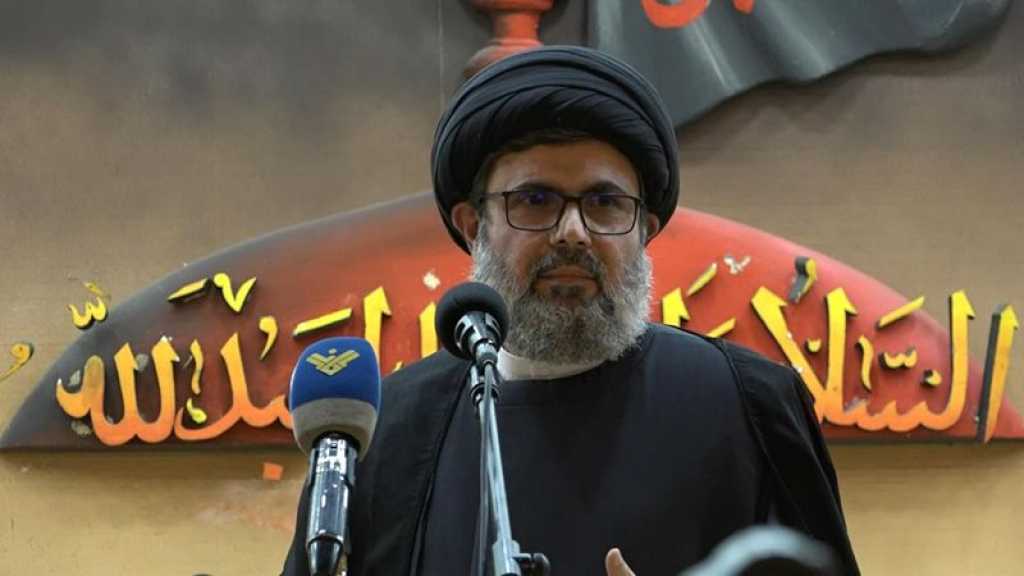
The head of Hezbollah’s Executive Council, His Eminence Sayyed Hashem Safieddine, is blaming Washington’s malign activates for the deteriorating situation in Lebanon.
“The most important causes behind the problems that Lebanon is enduring are the policies of the United States, especially that the banks are under US control, and the Lebanese economic system is a system affiliated with it. The tragedies that occurred throughout the past decades were under the watch and supervision of American policies. Despite that, America came to exert pressure.” Sayyed Safieddine said. “Instead of Washington helping find a solution, it pressured to suffocate the Lebanese.”
In his speech during a memorial ceremony held in the Husseiniya of the Lebanese southern town of Deir Qanoon Al-Nahr, Sayyed Safieddine warned that “we are facing many challenges in Lebanon today at the financial, economic, and political levels, and there are successive calamities. Therefore, whoever loses the standard and the balance is lost, while the matter remains clear to whoever does not lose both of them.”
“Things have been clear to us since the beginning of this crisis, which has exacerbated further. We diagnosed the disease and the medicine, but the problem is not with us, and we alone are not able to administer the medicine to this country at the level of solving its economic, social, and living problems. Rather, we diagnosed the problem and said what is required. But if others do not share with us, then survival, success, and a transition from this bad state to something better cannot be written for this country.”
Sayyed Safieddine believes that “these crises will end after a while, and this stems from our experience, faith, and understanding of these crises, but the important thing is that we work to reduce losses and find appropriate solutions, and this is the fundamental point of contention between us and others.”
“To this day, we feel that they have not been guided to the right path and are still following a path that does not lead anywhere and does not produce results, and we cannot anticipate a solution.”
Sayyed Safieddine stressed that “the American delegations that come to Lebanon want to draw an imaginary line for the solution for the Lebanese to follow. By doing so, they abandon their positions of strength, whether in the resistance, or in oil, or in any subjective economic future that Lebanon can build. After the Lebanese give up on this, they tell them that this is the way, which is in fact an imaginary path that does not lead to any solution.”
“If America really wants to solve the problem in Lebanon, it must leave the Lebanese oil to the Lebanese, not work for the ‘Israelis’, and stop its pressure [on Lebanon], including the sanctions, as well as on the countries that could have helped the Lebanese. What it did regarding dragging Egyptian gas to Lebanon through Syria was a reaction to bringing Iranian diesel to Lebanon.”
His Eminence pointed out that “we cannot trust America, its words, its actions, or the visits of its officials, and we advise those who follow America and its policies and even those who are slaves to it and its embassy to stop believing in false hopes. Those who previously bet on America with regard to Lebanon talked about how it abandoned them in the fifties and sixties, and those who depended on it today are living in anxiety and fear.”
He stressed that “some Arab and Gulf countries such as the UAE and Saudi Arabia are thinking about the future. They are saying that America is not the country they once knew because whoever left Afghanistan and its allies there like this cannot be trusted. Therefore, America’s historical allies in the region are worried about its policies and are afraid of a future based on these policies.”
His Eminence made it clear that “America does not want to find a solution in Lebanon and does not want to help solve it. The US statements are clear. They are waiting for the parliamentary elections, and if the result is satisfactory for them, then they will think of some way to open the doors but with conditions, and if they do not get the outcome they want from the elections, they will have another position.”












No comments:
Post a Comment